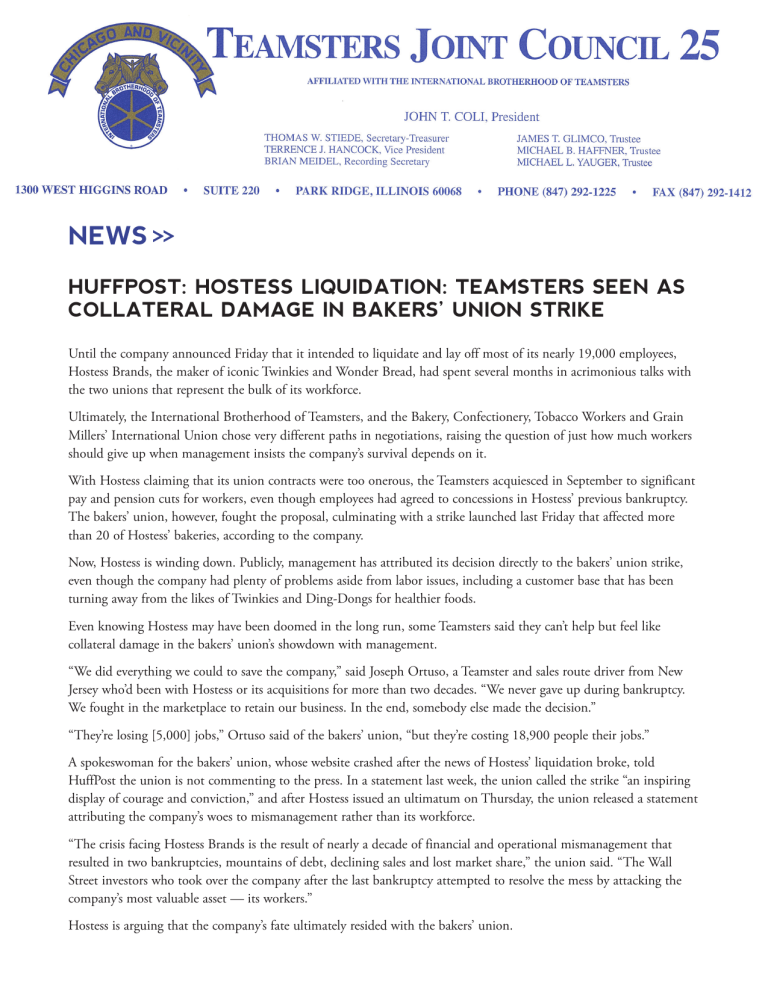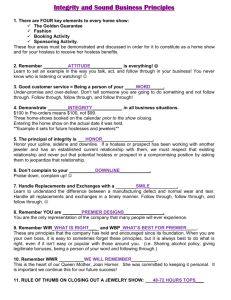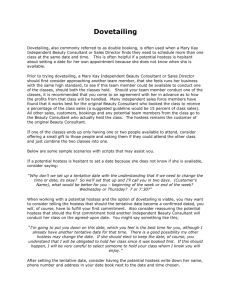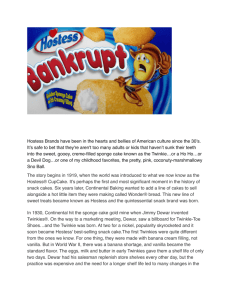
NEWS >>
HUFFPOST: HOSTESS LIQUIDATION: TEAMSTERS SEEN AS
COLLATERAL DAMAGE IN BAKERS’ UNION STRIKE
Until the company announced Friday that it intended to liquidate and lay off most of its nearly 19,000 employees,
Hostess Brands, the maker of iconic Twinkies and Wonder Bread, had spent several months in acrimonious talks with the two unions that represent the bulk of its workforce.
Ultimately, the International Brotherhood of Teamsters, and the Bakery, Confectionery, Tobacco Workers and Grain
Millers’ International Union chose very different paths in negotiations, raising the question of just how much workers should give up when management insists the company’s survival depends on it.
With Hostess claiming that its union contracts were too onerous, the Teamsters acquiesced in September to significant pay and pension cuts for workers, even though employees had agreed to concessions in Hostess’ previous bankruptcy.
The bakers’ union, however, fought the proposal, culminating with a strike launched last Friday that affected more than 20 of Hostess’ bakeries, according to the company.
Now, Hostess is winding down. Publicly, management has attributed its decision directly to the bakers’ union strike, even though the company had plenty of problems aside from labor issues, including a customer base that has been turning away from the likes of Twinkies and Ding-Dongs for healthier foods.
Even knowing Hostess may have been doomed in the long run, some Teamsters said they can’t help but feel like collateral damage in the bakers’ union’s showdown with management.
“We did everything we could to save the company,” said Joseph Ortuso, a Teamster and sales route driver from New
Jersey who’d been with Hostess or its acquisitions for more than two decades. “We never gave up during bankruptcy.
We fought in the marketplace to retain our business. In the end, somebody else made the decision.”
“They’re losing [5,000] jobs,” Ortuso said of the bakers’ union, “but they’re costing 18,900 people their jobs.”
A spokeswoman for the bakers’ union, whose website crashed after the news of Hostess’ liquidation broke, told
HuffPost the union is not commenting to the press. In a statement last week, the union called the strike “an inspiring display of courage and conviction,” and after Hostess issued an ultimatum on Thursday, the union released a statement attributing the company’s woes to mismanagement rather than its workforce.
“The crisis facing Hostess Brands is the result of nearly a decade of financial and operational mismanagement that resulted in two bankruptcies, mountains of debt, declining sales and lost market share,” the union said. “The Wall
Street investors who took over the company after the last bankruptcy attempted to resolve the mess by attacking the company’s most valuable asset — its workers.”
Hostess is arguing that the company’s fate ultimately resided with the bakers’ union.
“There was a lot of sacrifice,” Tom Becker, a Hostess spokesman, said of employees. “This wasn’t the first time they were asked to give something up. It’s been a difficult several years, period, here at Hostess. At the end of the day, the
Teamsters found a way to work with the company that would allow it to survive and the company appreciated that. It just needed both unions to be able to do that.”
With Twitter users piling on the bakers’ union Friday, labor groups including the AFL-CIO were quick to defend the union and its members. “These workers, who consistently make great products Americans love and have offered multiple concessions, want their company to succeed,” Richard Trumka, AFL-CIO chief said in a statement. “They have bravely taken a stand against the corporate race-to-the-bottom. And now they and their communities are suffering the tragedy of a needless layoff.”
Even though they eventually arrived at an agreement, the negotiations between Hostess and the Teamsters were far from smooth. At one point the company asked a judge to let it unilaterally change the conditions of the workers’ contract, embittering many Teamsters. Both sides describe the process as emotionally charged. In the end, members approved the concessions in Hostess’ “last, best offer” with a narrow 53 percent vote. The contract gave workers an equity stake in the company but included a painful 8 percent pay cut. The Teamsters also agreed to a partial overhauling of the pension system.
(Hostess has stressed that sacrifices were made across-the-board at the company, though workers may feel like they’ve given up far more than executives. As the Wall Street Journal reported, the company’s four top executives agreed earlier this year to work for a salary of $1 until Hostess emerged from bankruptcy — but only after enjoying raises of 75 to
80 percent in 2011, when the company had already hired restructuring lawyers.)
The bakers’ union may have believed a better offer was coming from Hostess, though it’s unclear whether the union felt Hostess was bluffing with its dire warnings. If the union knew its strike could help lead to liquidation, its leadership and members may have chosen to fight the concessions anyway in order to maintain its contracts with other companies. Had it caved, other bakery companies may have demanded similar givebacks.
Hostess set a deadline of 5 p.m. Thursday for the bakers’ strike to end, otherwise it would seek liquidation. The
Teamsters responded by publicly calling upon the bakers’ union to hold a secret ballot vote to decide whether to continue the strike — an indication that the Teamsters felt some of the bakers’ union rank-and-file may have felt differently about the strike than union leadership.
Ken Hall, the Teamsters secretary-treasurer, said his union didn’t doubt Hostess’ claims after seeing its books.
“I think it’s obvious there was no bluff,” said Hall. “Our financial advisers had looked at their books, they had total access. We pushed them in negotiations to where we thought it was the absolute limit, that we would get the most for our members and [still] have a pathway back to prosperity for the company. The bakers’ union disagreed with that.”
“Frankly, I feel sick about what’s going on here,” Hall added. “It’s a tragic day for 18,000 workers.”
Rich Pavelko, a Hostess driver who started selling Drake’s products 31 years ago, said he felt the company was generally in tatters after years of poor decision-making at the executive level. But another pay cut was better than being unemployed, he said, and perhaps the company would find a way to right itself or at least make itself attractive to a
committed buyer.
“We always thought and we know that the company was mismanaged horribly,” 55-year-old Pavelko, who’s a Teamster, said Friday. “But that’s the past. You can’t say, well, because it was mismanaged in the past we can’t give up something now to keep the company alive.”
Ortuso said a colleague informed him midday Friday that workers showing up at a delivery truck depot in Neptune,
N.J., were given packets that included a letter. It informed them that they were terminated as of that day.
Ortuso has been a route salesman for 25 years. Asked what his plan was, he didn’t hesitate. “I’m going to go out there and pound the pavement like the other 8 percent of the country that’s unemployed,” he said.
This story originally appeared in the Huffington Post on November 16, 2012.






